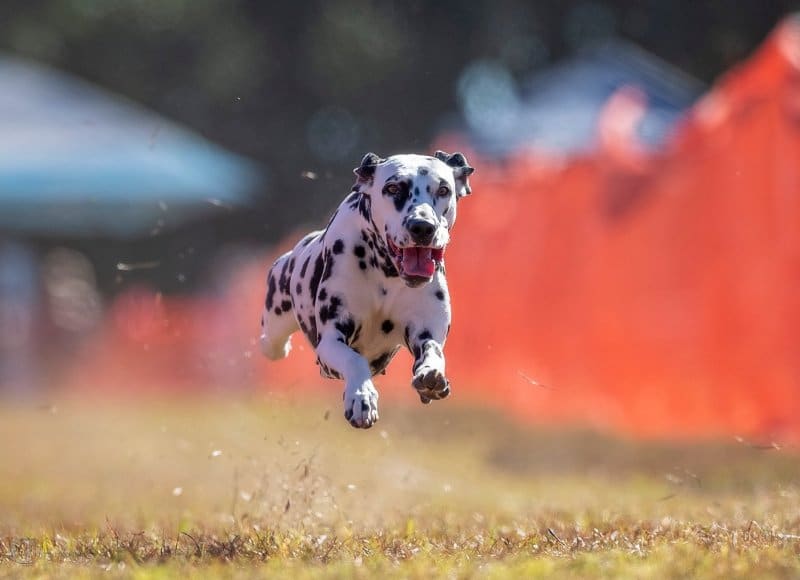Interview with Amanda Gill
My name is Amanda Gill with Crescent Hill Dalmatians. I have been in the breed for just over five years. My husband and I live on a small farm in coastal South Carolina with our five dogs (four Dalmatians and a Labrador mix), a cat, horses, and other critters. We recently raised our first home-bred litter of Dalmatians and we enjoy competing in Conformation, Obedience, and Performance Events.
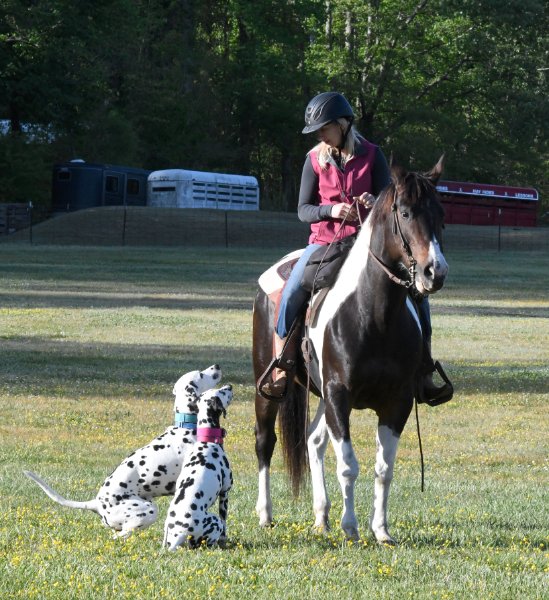
How were you introduced to the Dalmatian?
Amanda Gill: Surprisingly, I never had a huge interest in the Dalmatian breed growing up, but my husband, who is a firefighter, did. I had plenty of dogs growing up, but came from a non-dog show family and truly had no idea about the dog show world. When my husband and I got to the point of adding a second dog to our family, I began researching the breed more, and that is when I realized how perfect the breed was for our lifestyle. We were an active family and I have been involved in horses most of my life. I was surprised to find out they were originally bred to be carriage dogs and had a natural affinity for horses.
The more I read about their personality and drive, the more I was interested in them. I was lucky enough to find an amazing breeder right from the start whom we bought our first Dalmatian from a year later in 2017. She is still my mentor and someone I look up to today. Since then, we have added three additional Dalmatians to our family and I just began my journey as a preservation breeder this past August with my first litter.
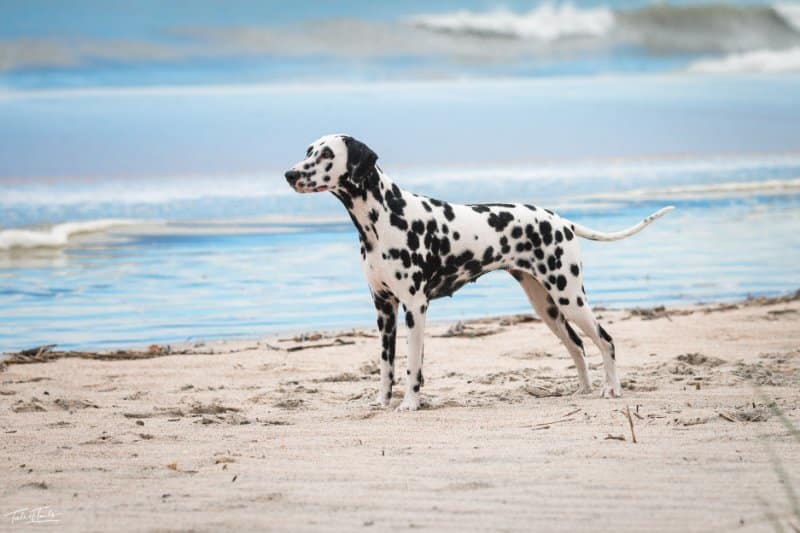
Do you compete in Performance Events as well as Conformation?
Amanda Gill: Yes, we compete in both Conformation and Performance Events. One of my passions is competing in Road Trials, which is a Dalmatian-specific event that displays the breed’s heritage working with horses. I love preserving our breed’s purpose by trialing them in these events that require the handler to be on horseback (or carriage) while they perform a variety of Obedience exercises with the dogs. It’s like Obedience, but on horseback!
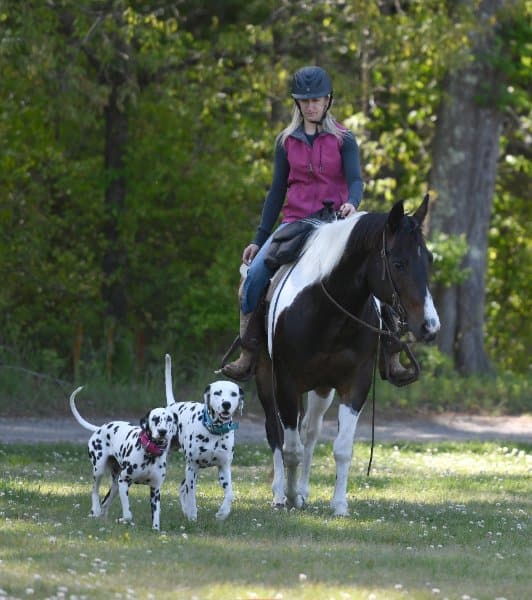
The dog/horse/handler team is then required to complete a 12.5- or 25-mile ride to show the Dalmatian’s endurance and natural instinct to work with horses out on a trail where any type of distraction could present itself. I think it is an under-recognized sport that even some Dalmatian owners aren’t aware of.
We also compete in regular Obedience, Rally, Dock Diving, Fast CAT, Coursing, and more. We enjoy doing Therapy Dog work when we aren’t competing. The Dalmatian breed is so versatile and seems to excel in any sport you commit yourself to.
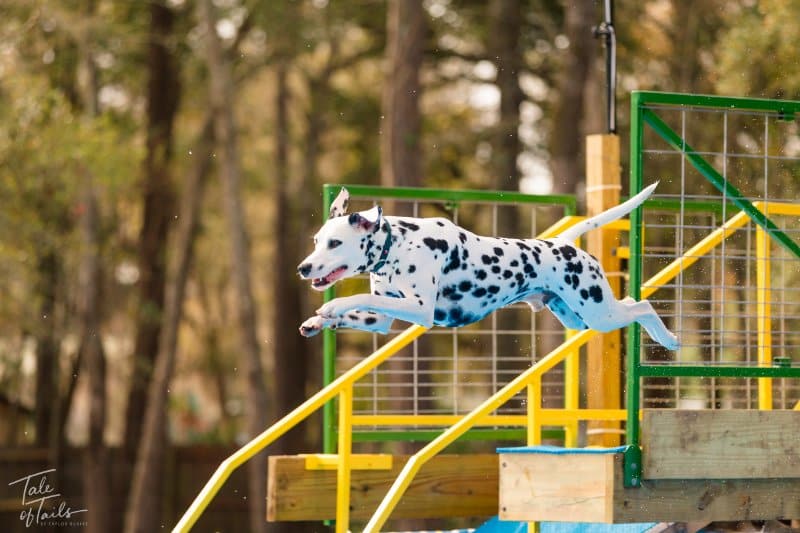
When did your Dalmatians begin competing in Performance Events?
Amanda Gill: I started competing in Performance Events with my first Dalmatian, “Pierce,” in 2018. Our first competition was actually a Road Trial when he was just over a year old, and likely another reason why I am so passionate about these events. That trial was the beginning of what I hope to be a lifelong experience. Now that we are more involved in the breed and with a variety of events, we begin competing with our dogs between a year and a year and a half old. We occasionally dabble in Rally if they are mentally ready, in addition to Conformation at around six months old, and it’s a great way to bring young dogs around the sights and sounds of trials.
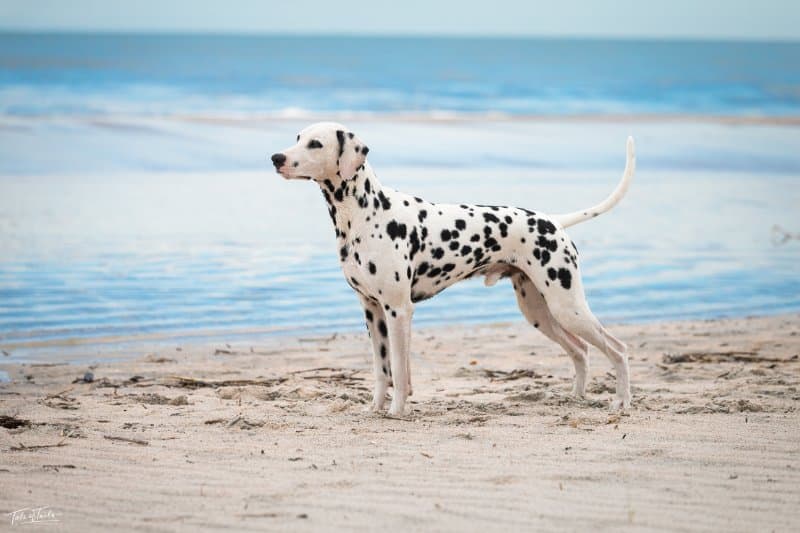
Is there any special preparation that’s needed? Conditioning? Training?
Amanda Gill: I am a strong believer that training starts as puppies with shaping behaviors, commands, and positioning, such as heeling, stays, recalls, working around distractions, and so on. For me, training is something done every day, even if it isn’t in a formal setting. Feeding the dogs their meals as their reward for certain behaviors is a great way to get in quick training sessions. Also, since my passion is in Road Trials, I prefer to safely introduce my puppies to the horses at a young age and start incorporating commands while I am mounted versus on the ground. All of my dogs seem to think my horses are magic treat machines! When the dogs are older and have basic commands down, we start training with them (and the horses) in new environments that are safe and allow off-leash dogs.
Conditioning for me is very age-dependent, seeing that puppies shouldn’t be taken for long trail rides at too young an age. When age-appropriate, and preparing for an actual Road Trial, I will make sure that my dogs start conditioning about three months before the event. Similar to how a person trains for a marathon, I try to start off with shorter distances of a few miles and work up from there.
Those few months are usually good for conditioning the dog and the horse (and you can still work on training at the same time). I also really enjoy doing bike work with the Dalmatians. Similar to being in the hock (heel) position on a horse, Dalmatians seem to naturally stay alongside a bicycle. It’s a wonderful way to help condition the dogs for an upcoming competition in any event and it’s often a way for exhibitors who don’t have access to horses to train for Road Trials.
I also enjoy taking the dogs to our local Dock Diving pool and working on things like foot placements, where they take off from the dock, and I even work on training myself in throwing the bumper correctly—because we all know most of us could work on this! Apart from that, I am blessed to live on a small hobby farm where my dogs have room to run and play. I find that chasing each other and playing fetch in the large fields keeps my dogs conditioned well, in addition to working on focused conditioning.
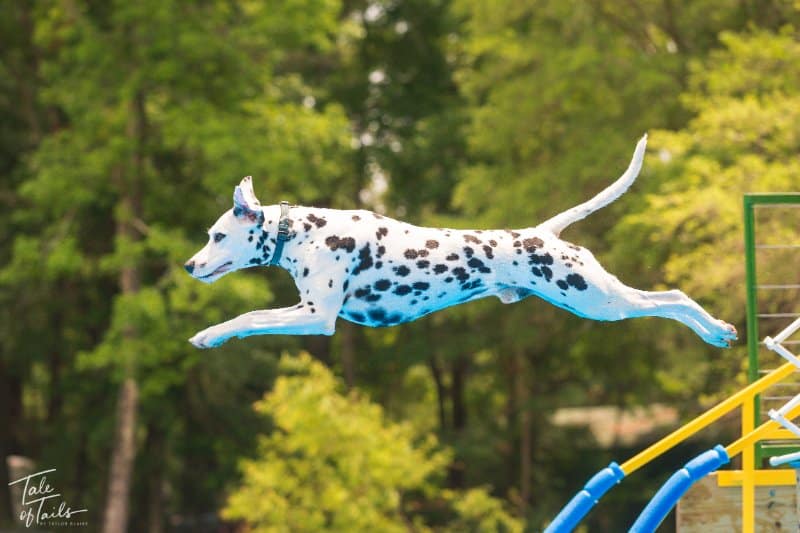
Do you feed a diet specifically for Performance Events? Any supplements?
Amanda Gill: I do not feed any special diet. I feed a Royal Canin diet regardless of the events we do. I will often give my dogs a high-calorie snack, such as Dogswell Energy, halfway through an event to give them that extra push from time to time. But I find that my dogs perform well with a good, balanced diet from a reputable company.
What are the benefits of competing in Performance Events? The risks?
Amanda Gill: First and foremost, Performance Events strengthen my relationship with my dogs. From the training leading up to the event, to the event itself, the excitement I get to share with my dogs in celebrating our accomplishments builds an incredible bond with them, and I love that. I also find that in my breeding program, Performance Events, in addition to Conformation, proves my dogs to be worthy enough to be bred.
We can all appreciate a beautiful dog conforming to the Breed Standard in the ring, but I also want to pass on intelligence, drive, endurance, trainability, and overall temperament into my lines. Many of us say we want to preserve our breed’s history and that’s why we breed purebred dogs, but how do we know if we are really preserving our breeds if we don’t ask our dogs to perform the tasks for which they were bred?
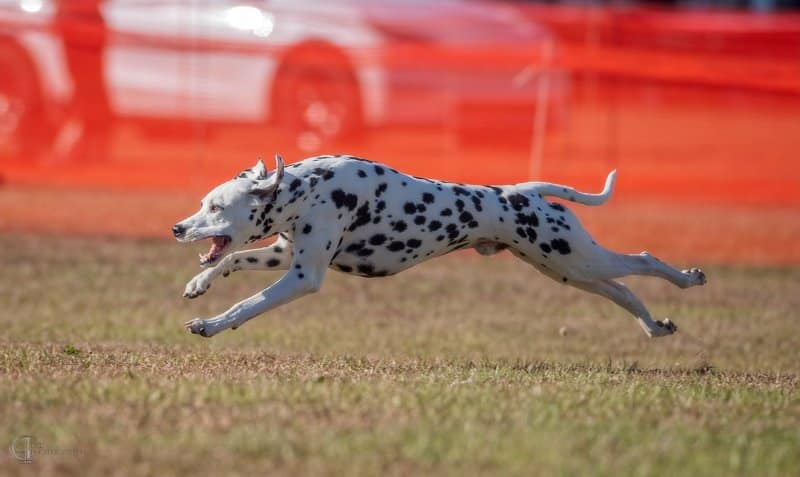
There are risks and rewards in nearly everything we do. Performance Events require our dogs to be top athletes. Even with proper conditioning, injuries can happen with our dogs just as it can happen in human athletes. It’s important to condition your dog to the event you are asking them to do. Knowing your dogs and how they move and act on a normal basis will help you catch small inconsistencies in them, to know if something needs to be looked at.
We have utilized massage, chiropractic adjustments, and light therapy to keep our dogs in competition-ready condition. You also have a responsibility to be your dog’s advocate to keep them safe. I have been in a few situations where I have pulled my dogs from what I thought was an unsafe situation for them. Losing my entry fees on those rare occasions outweighed the risk I felt I was putting my dogs in due to something such as unsafe footing.
Are there any Performance Events you haven’t tried but are considering?
Amanda Gill: One of my goals over the next few years is to get started in Agility. I really enjoy watching dog and handler teams in the Agility ring, with fast-paced communication and displays of the dog’s athletic ability. It’s really beautiful to watch.
How do you stay motivated? How do you establish (and achieve) goals?
Amanda Gill: My ultimate motivation is my dogs. I have been blessed with breeders allowing me to have these well-bred, well-tempered, and biddable Dalmatians that have so much to offer, and I want to let them excel in anything they have the drive to do. Strengthening the relationship with my dogs and seeing them genuinely happy and excited to “work” keeps me going. I also strive to be the best version of a preservation breeder that I can be, and some of that entails showing my dogs and proving their ability to be everything from great family pets to top athletes.
One thing that helps me achieve my goals is saying them out loud and sharing what my goals are with others. It’s a form of accountability for me, as I tend to be someone who, once I say I am going to do something, has to find a way to accomplish it!
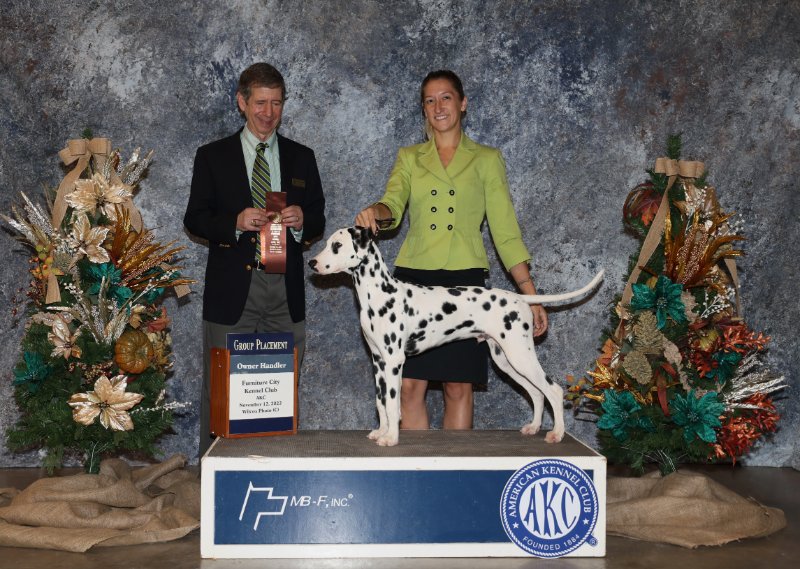
What is the one thing everyone should know about the Dalmatian?
Amanda Gill: Oh, goodness, I feel like there could be so much written here. But if I had to pick ONE thing, I would say that they are one of the most loyal breeds of dog that I’ve ever been around. Many Dalmatian owners even call them “Velcro Dogs” (and I thought I knew what that was before I had a Dalmatian). I truly had no idea!
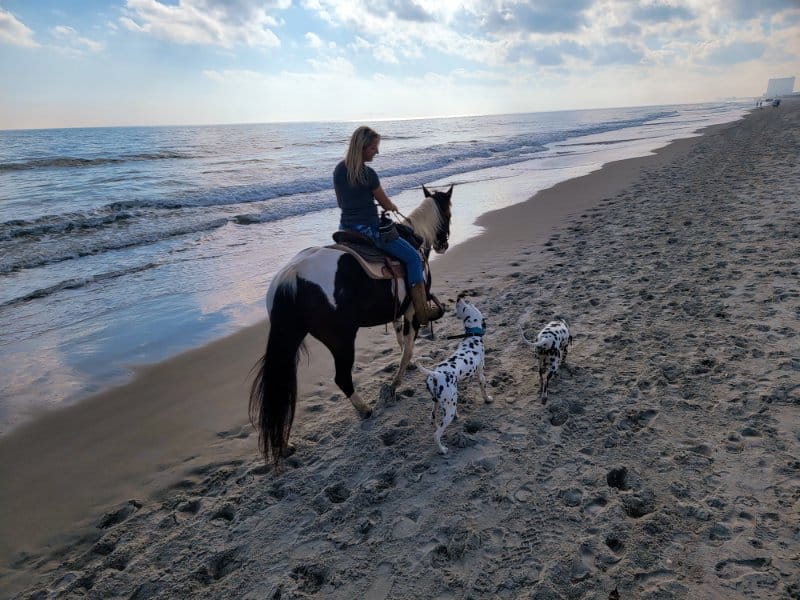
Do you have any advice for someone who is just getting started?
Amanda Gill: First, don’t be afraid to try something new. The best way to truly learn a different sport is to get you and your dog to the events, enter, talk to competitors, and be willing to learn. Don’t be afraid of failing. I have learned so much from trialing, not qualifying, and leaving, knowing what my dog and I need to work on for the next time. And your dog may just surprise you!
I mentioned my first Road Trial earlier. My Dalmatian was only 14 months old at the time and most dogs didn’t attempt their Road Dog title until they also had Obedience titles. I entered anyway, knowing it was going to be a good experience for my dog and me. My dog, Pierce, won High in Trial that weekend and became the youngest Dalmatian to receive a Road Dog title. It was also the first title I put on a dog and something I will never forget.
Secondly, I would say to surround yourself with great mentors and friends in the breed or sport that you are interested in. I could never begin to write down all of the things I have learned through great people in my breed and dog world in general.
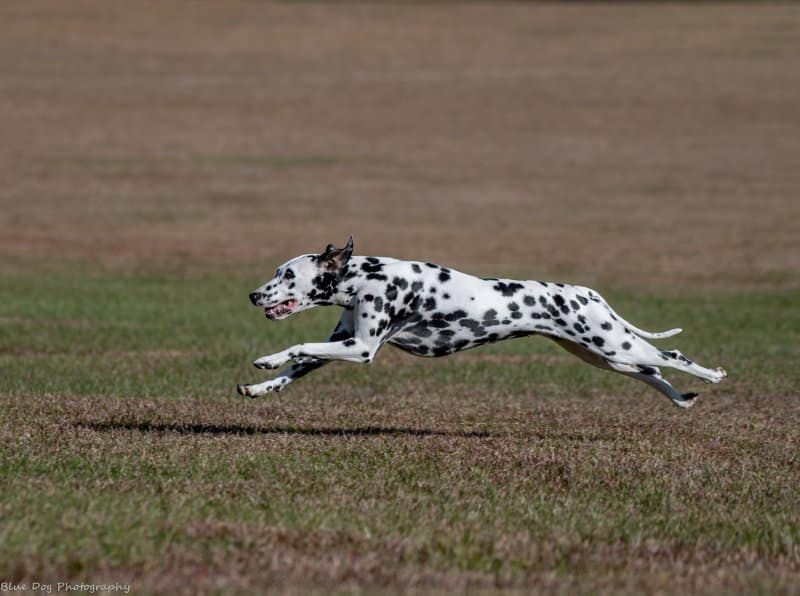
“The best way to truly learn a different sport is to get you and your dog to the events, enter, talk to competitors, and be willing to learn. Don’t be afraid of failing.”


